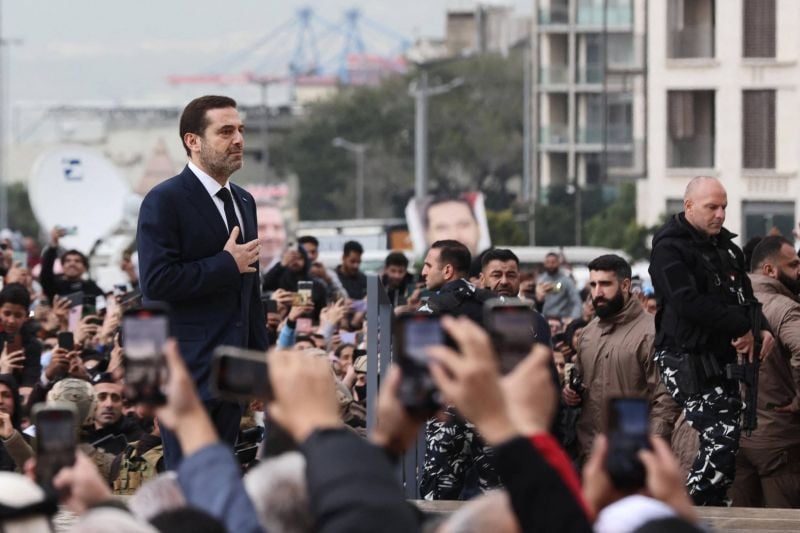
Former Lebanese prime minister Saad Hariri greets his supporters after he prayed at the grave of his father, slain prime minister Rafic Hariri, during a commemoration for the 19th anniversary of his assassination, in Beirut, on Feb. 14, 2024. (Credit: Anwar Amro/AFP)
Want to get the Morning Brief by email? Click here to sign up.
Catch up on our LIVE coverage of Day 130 and Day 131 of the Israel-Hamas war.
Serial Israeli air strikes on southern Lebanon yesterday, retaliating for a cross-border strike that killed one person and wounded eight others in northern Israel, killed a mother and two of her children, aged two and 13, as well as four others in Nabatieh and three Hezbollah members. The strikes come one day after Hezbollah chief Hassan Nasrallah undermined Israel’s willingness to expand its conflict with the party while warning that they would retaliate in kind to any escalation. The cross-border strike on Israel, unclaimed by Hezbollah, fell near a medical center while targeting a military base, according to Israeli media. On Tuesday, an anti-tank missile attack from Lebanon on Tuesday seriously wounded a mother and her son in northern Israel. The same day, Israeli shelling killed three Hezbollah members and severely damaged “a civil defense center, ambulances, and a rescue vehicle” in Mais al-Jabal belonging to the Amal Movement-affiliated al-Risala Scout Association.
In a speech commemorating Hezbollah’s wounded on Tuesday, after months of border clashes killed nearly 200 party members, Nasrallah claimed the party’s “battle” was behind “border security, maintaining peace [and] deterring Israeli aggression.” Nasrallah reiterated a cease-fire in Gaza as a precondition to ending attacks on Israel, portraying the various foreign delegations that have visited Lebanon attempting to quell border clashes as mainly serving Israeli interests. On Tuesday, Reuters reported on a French proposal to end the southern Lebanese border clashes. The text, delivered to Lebanese and Israeli officials, proposes Hezbollah withdraw 10 kilometers from the border, a third of the distance set to be free from non-state arms in UN Security Council Resolution 1701, in the first step of a 10-day plan involving bolstering the Lebanese Army’s border presence and “gradual” resumption of talks on disputed border areas. Mikati, who is set to meet with US envoy Amos Hochstein today and tomorrow, said the proposal was not “an official paper from the French side, but rather a paper of ideas.”
Nasrallah is scheduled to speak again tomorrow, for discussion including “the presidential issue and the political exploitation of events.”
Thousands of people gathered in Downtown Beirut to express support for former Premier Saad Hariri during his second visit to Lebanon since retiring from politics in 2022 to mark 19 years since the assassination of his father, former Prime Minister Rafik Hariri. “In due time,” Saad Hariri told supporters, laconically expressing solidarity with a crowd urging his return to politics. The former prime minister met with several Lebanese and international officials on Tuesday. Hariri left politics in 2022, forbidding Future Movement members from running the Parliamentary elections, and has since lived in the United Arab Emirates. Hariri ended his last bout as prime minister-designate after failing to form a government months after being reinstated to the post following his resignation under popular pressure in 2019. The Special Tribunal for Lebanon, formed to investigate the bombing that killed Rafik Hariri and 21 other people, sentenced Hezbollah members Habib Merhi, Hussein Oneissi, Salim Ayyash and Assad Sabra in absentia for the assassination. Hariri’s death triggered a wave of protests culminating in the withdrawal of thousands of Syrian troops deployed to Lebanon for 29 years.
Lebanon denied entry to 116 Syrian nationals returned by Cyprus after an informal sea migration attempt, Cypriot officials said Tuesday. The attempted migrants’ status, and location, remain unconfirmed. Last August, the Lebanese Foreign Ministry affirmed it would deny entry to non-Lebanese informal migrants “regardless of their boat's starting point,” after criticism from human rights NGOs regarding the deportation to Syria or detention by General Security of several people forcibly returned from Cyprus. Cypriot authorities, facing an influx of clandestine migrants, have repeatedly called for European aid to Lebanon, calling the country a “barrier” without which “all of Europe will have a problem.”
At least 28,473 people have been killed in Gaza since Oct. 7, according to a Tuesday death toll from the enclave’s health ministry.
Cease-fire talks have stalled with no major strides toward a new deal according to the CIA chief in Cairo, the Wall Street Journal reported. Israel will not send back its delegation to Cairo. Meanwhile, international actors reiterated calls against Israel’s looming invasion of Rafah where more than one million people have been crowded and displaced by the Israeli military invasion of Gaza.
In case you missed it, here’s our must-read story from yesterday: “Lines and circles: Palestinian dabke group in Beirut manifests a return home”
Compiled by Abbas Mahfouz